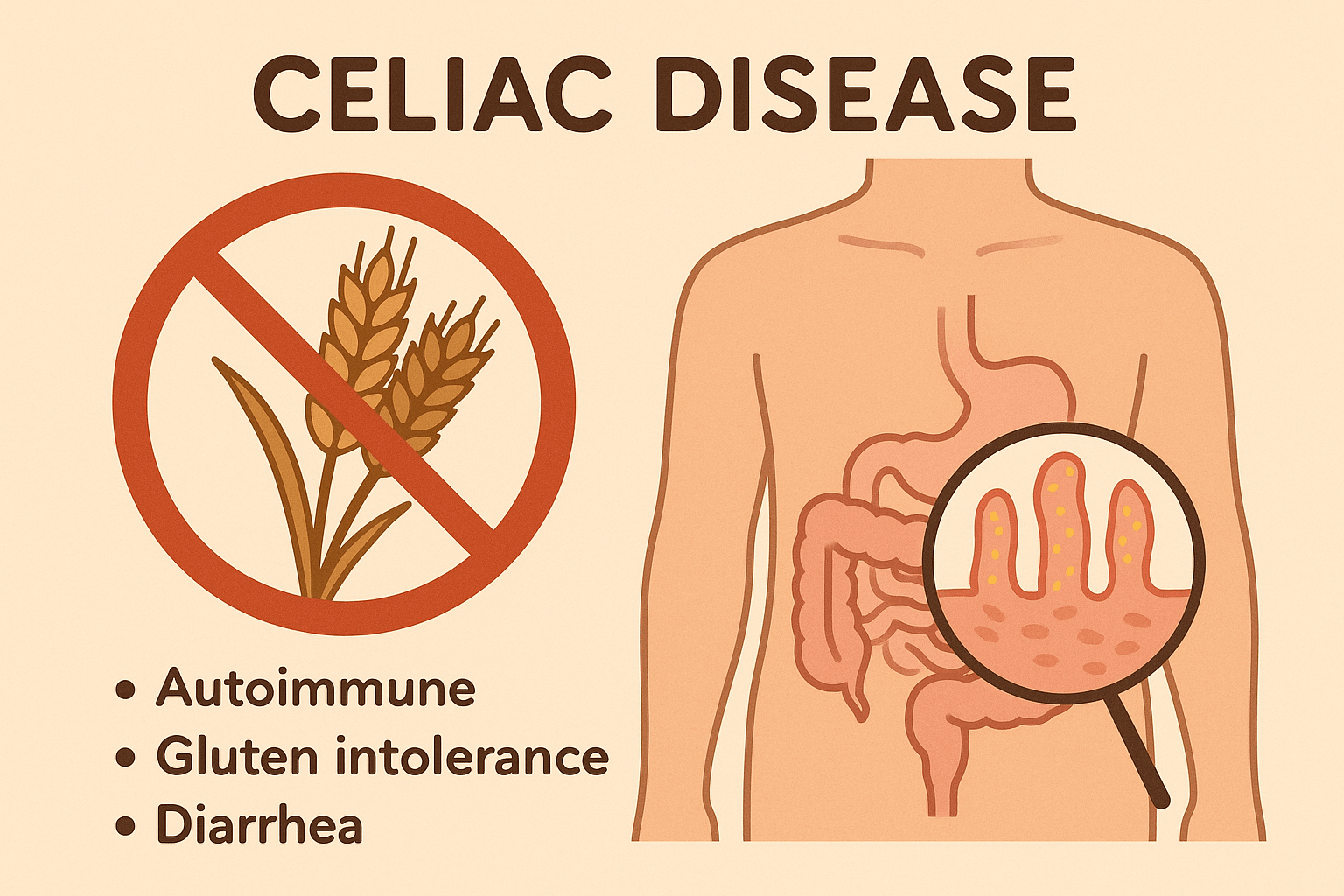Imagine trying to manage symptoms such as severe lethargy, stomach ache, or unexplained weight loss, only to find out that the culprit was a common food source- gluten. Celiac disease is an autoimmune disease caused by gluten consumption, occurring in 1 out of 100 persons worldwide. A lot of people still have the disease without having been diagnosed and are going about life bearing symptoms without knowing what is inflicting them.
This article explores the very core of celiac disease and its consequences, ways of management, and treatments in the offing.
Why Celiac Disease Matters
Celiac disease is not just an intolerance; it is an autoimmune disorder wherein gluten ingestion damages the lining of the small intestine. Long-term damage restricts the absorption of nutrients and variably leads to other health problems such as anemia, osteoporosis, infertility, and disorders of the nervous system. Prevention of long-term complications requires early diagnosis and strict adherence to a gluten-free diet.
Core Information About Celiac Disease
Understanding the Disease
The disease sets in when the immune system identifies gluten, which is found in wheat, barley, and rye, and perceives it as a threat against which it mounts an immune attack on the lining of the small intestine. The villi of the small intestine, which take in nutrients, get damaged in the process, and the nutrients get malabsorbed.
Common Symptoms
- Digestive Issues- bloating, diarrhea, constipation, and abdominal pain.
- Nutritional Deficiencies- iron-deficiency anemia, weight loss, and fatigue.
- Dermatological Manifestations: Itchy skin rash known as dermatitis herpetiformis.
- Neurological Symptoms: Headaches, depression, and peripheral neuropathy
It’s noteworthy that some individuals may be asymptomatic yet still experience intestinal damage.
During Diagnosis of Celiac Disease: A Stepwise Approach
- Serology: Blood work to detect specific antibodies (e.g., tTG-IgA).
- Endoscopic Biopsy: When serology turns positive, it is followed by an upper endoscopy to obtain biopsies from the small intestines to confirm villous atrophy.
- Genetic Testing: Identification of HLA-DQ2 or HLA-DQ8 genes associated with celiac disease.
The patient must continue to take gluten before testing to have correct results.
Handling Celiac Disease: Practical Tips
Following a Gluten-Free Diet
- Eliminate Gluten-Containing Grains: Avoid wheat, barley, rye, and their derivatives.
- Read Labels Carefully: Gluten can be present in sauces, dressings, and processed foods.
- Prevent Cross-Contamination: Use separate kitchen utensils and appliances.
Nutrition Disorders
Due to deficiencies brought about by celiac disease, supplementation of some nutrients should be considered:
- Supplement if Needed: Iron, calcium, vitamin D, B12, and folate.
- Consult a Dietitian: For individualized dietary advice.
Practical Application: A Case Study
A 51-year-old lady presented with watery diarrhea, weight loss, and electrolyte imbalance. After an extensive workup, she was diagnosed with celiac disease. Instituting a strict gluten-free diet led to marked improvement in her symptoms and nutritional status.
Common Mistakes to Avoid
- Assuming Occasional Gluten Is Harmless: Even minor exposure damages the intestines.
- Using Symptom Resolution as the Sole Criterion: Being free from symptoms is not enough; mucosal healing must be confirmed.
- Not Following Up: Follow-up checks are needed to keep an eye on nutritional status and adherence.
Future Trends: Emerging Therapies
While gluten restriction is still the mainstay of treatment, adjunct treatment modalities are being sought:
- Inverse Vaccines: To retrain the immune system to tolerate gluten.
- Enzyme Therapies: Including latiglutenase, intended to degrade gluten in the digestive tract.
- Tight Junction Regulators: Such as larazotide acetate, which might prevent gluten from crossing the intestinal barrier.
These therapies, were they to come to market, would provide further protection from accidental gluten exposure.
Conclusion: Knowledge Is Power
Celiac disease is controllable with the right management. Informing yourself about the condition, following a strict gluten-free diet, and keeping abreast of therapies under research can greatly enhance one’s quality of life. If the possibility of having celiac disease crosses your mind, get tested and advised by a healthcare professional.
Stay proactive about your health. If you experience symptoms suggestive of celiac disease, seek medical advice promptly. For those diagnosed, consider joining support groups and staying updated on the latest research to manage your condition effectively.




